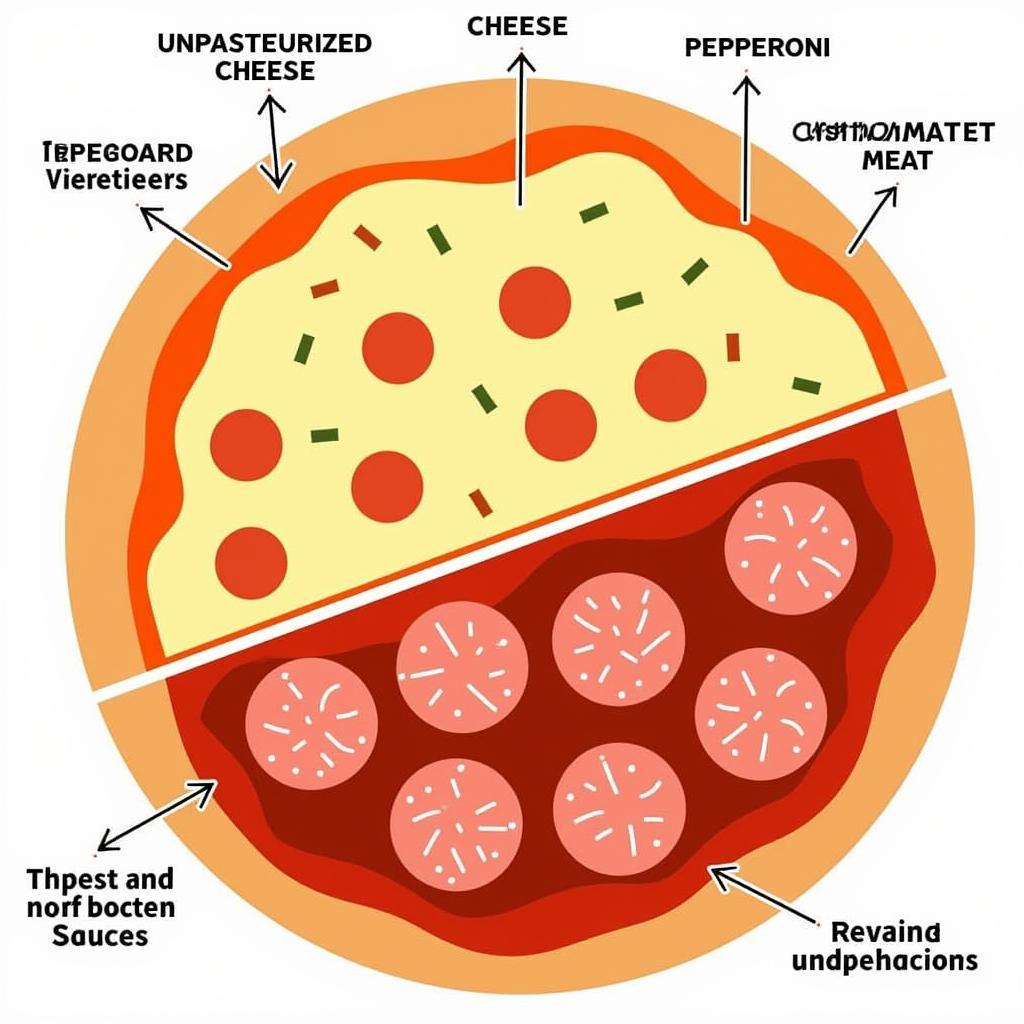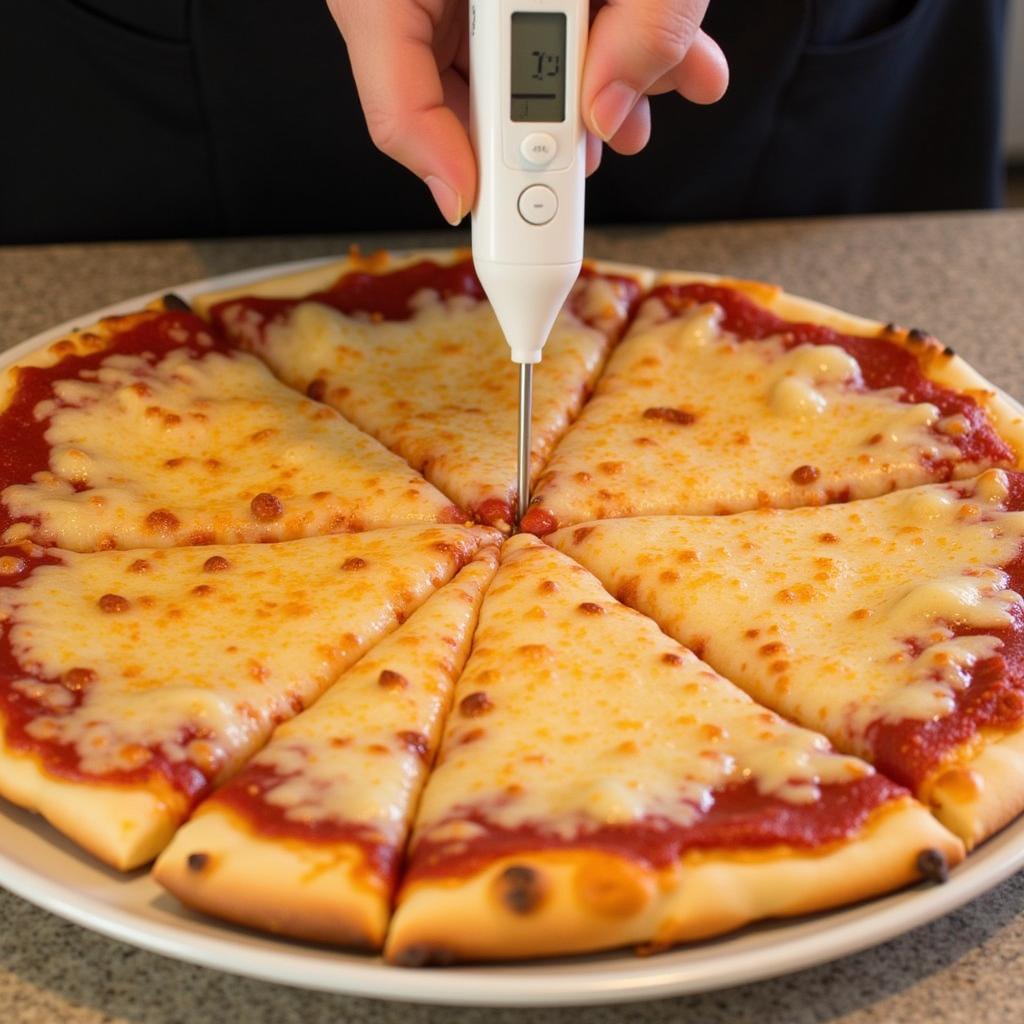Food Poisoning From Frozen Pizza might seem unlikely, but it’s a real risk. While convenient and delicious, frozen pizzas can become a breeding ground for bacteria if not handled or cooked properly. Knowing the risks and taking precautions is crucial to enjoying your favorite frozen meal safely.
Common Culprits: Bacteria Found in Frozen Pizza
Several types of bacteria can lead to food poisoning from frozen pizza, with some of the most common being:
- Salmonella: Often found in raw poultry, eggs, and sometimes even dough, Salmonella can contaminate pizza during processing.
- Listeria: This bacteria thrives in cold environments and can survive even in a frozen pizza. It’s particularly dangerous for pregnant women, newborns, older adults, and people with weakened immune systems.
- E. coli: Contamination with E. coli can occur during the processing of ingredients or handling of the pizza. It can cause severe food poisoning symptoms.
 Frozen pizza ingredients with potential contamination sources marked.
Frozen pizza ingredients with potential contamination sources marked.
How Does Frozen Pizza Become a Food Poisoning Risk?
While freezing food can slow down bacterial growth, it doesn’t eliminate it entirely. Bacteria can survive freezing temperatures and start multiplying rapidly when the pizza thaws. Here’s how frozen pizza can become a food poisoning risk:
- Improper Storage: Fluctuating freezer temperatures or thawing and refreezing the pizza can create ideal conditions for bacterial growth.
- Undercooking: Not cooking the pizza to the recommended internal temperature can allow harmful bacteria to survive.
- Cross-Contamination: Using the same utensils or surfaces for raw and cooked pizza can transfer bacteria.
Recognizing the Signs: Food Poisoning Symptoms
Food poisoning symptoms can vary depending on the type of bacteria and the amount consumed. Common signs include:
- Nausea and vomiting
- Diarrhea
- Abdominal cramps
- Fever
- Headache
- Weakness
 Person experiencing stomach pain, a common symptom of food poisoning.
Person experiencing stomach pain, a common symptom of food poisoning.
If you experience severe symptoms like bloody diarrhea, dehydration, or a high fever, seek medical attention immediately.
Safety Tips: Enjoying Frozen Pizza Safely
Don’t let the risk of food poisoning stop you from enjoying a convenient frozen pizza. By following these safety tips, you can significantly reduce the chances of getting sick:
- Check the Temperature: Ensure your freezer is set at or below 0°F (-18°C) to keep the pizza frozen solid.
- Thaw Safely: Thaw the pizza in the refrigerator overnight, not on the counter at room temperature.
- Cook Thoroughly: Follow the package directions for cooking time and temperature. Use a food thermometer to ensure the pizza reaches an internal temperature of 165°F (74°C).
- Prevent Cross-Contamination: Wash your hands, utensils, and surfaces thoroughly with hot, soapy water after handling raw pizza.
- Don’t Risk It: If the pizza looks or smells off, or if it’s been left out at room temperature for more than two hours, discard it.
 A person using a food thermometer to check the internal temperature of a cooked frozen pizza.
A person using a food thermometer to check the internal temperature of a cooked frozen pizza.
Conclusion
While the convenience of frozen pizza is undeniable, it’s essential to prioritize food safety. By understanding the risks, handling and cooking your pizza properly, and being mindful of potential symptoms, you can enjoy this convenient meal without worry. Remember, when it comes to food poisoning, prevention is always better than cure.
FAQs about Food Poisoning From Frozen Pizza
Can you get food poisoning from eating a frozen pizza that was left out overnight?
Yes, leaving a frozen pizza out at room temperature for more than two hours allows bacteria to multiply rapidly, increasing the risk of food poisoning.
How long after eating a bad frozen pizza will I get sick?
Symptoms of food poisoning can appear anywhere from a few hours to several days after consuming contaminated food.
Can I refreeze a thawed frozen pizza?
It’s not recommended to refreeze a thawed frozen pizza as it can compromise the quality and increase the risk of bacterial growth.
Need assistance? Don’t hesitate to contact us!
Phone: 02437655121
Email: minacones@gmail.com
Address: 3PGH+8R9, ĐT70A, thôn Trung, Bắc Từ Liêm, Hà Nội, Việt Nam
Our customer support team is available 24/7 to assist you.